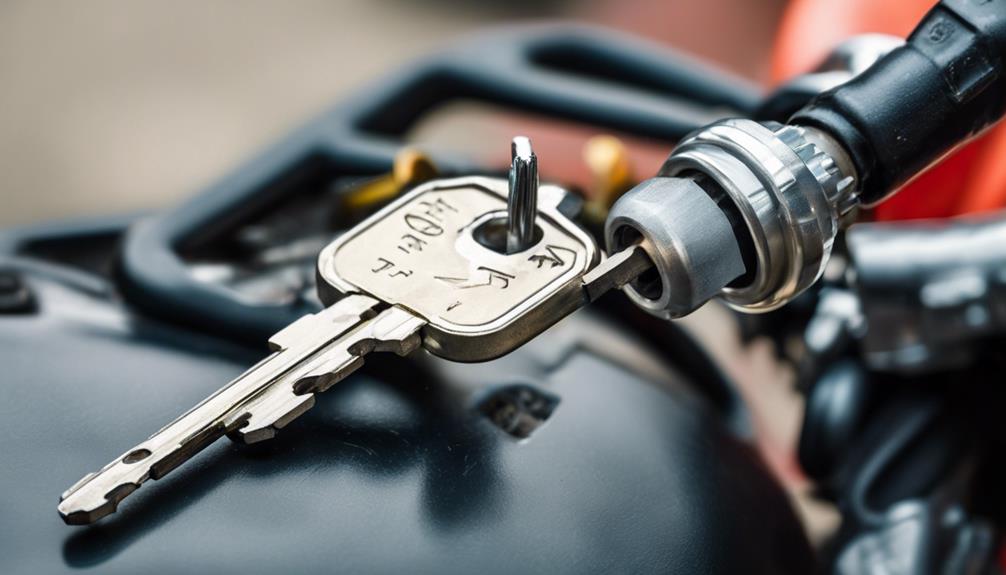Re-keying your motorcycle or scooter locks is a smart choice to boost security and gain peace of mind, especially if you've lost a key or bought a second-hand bike. To get started, you'll need a rekeying kit, some precision screwdrivers, tweezers, and a flashlight. The process involves disassembling the lock, swapping out the old pins for new ones that match your new key, and reassembling everything. Be mindful of potential challenges, like stubborn components or keeping tiny parts organized. To keep your locks in top shape after rekeying, regular maintenance is key. There's more you should know to make this easy!
Key Takeaways
- Rekeying enhances motorcycle security and is essential after losing keys or buying second-hand units.
- A rekeying kit with pins, springs, and precision tools is necessary for the process.
- Follow a step-by-step approach: disassemble, replace old pins, and reassemble the lock.
- Regular maintenance, including lubrication and cleaning, ensures locks operate smoothly post-rekeying.
- Keep track of small components and use proper techniques to avoid damaging the lock.
Importance of Rekeying
Rekeying your motorcycle and scooter locks is vital for maintaining security. When you think about it, your bike represents not just a mode of transport but also your freedom and adventure. Ensuring that only you have access to it is essential.
Rekeying motorcycle locks can greatly enhance your safety by preventing unauthorized access. This process isn't only cost-effective but can also save you from the hassle of having to replace locks entirely, which can be time-consuming and expensive the advantages of re-keying locks.
If you've recently lost a key, had a bike stolen, or if you've purchased a second-hand motorcycle, it's wise to rekey the locks as soon as possible. This simple step can give you peace of mind, knowing that your bike's security is reinforced.
Additionally, if you've lent your motorcycle to friends or family, rekeying can eliminate the worry about who still has a key. By rekeying, you're taking control of your motorcycle's security, ensuring that it remains just for you and those you trust.
Investing time in rekeying motorcycle locks not only protects your property but also serves as a proactive measure for your community. By sharing best practices in security, you're helping others safeguard their rides too.
Tools Required for Rekeying
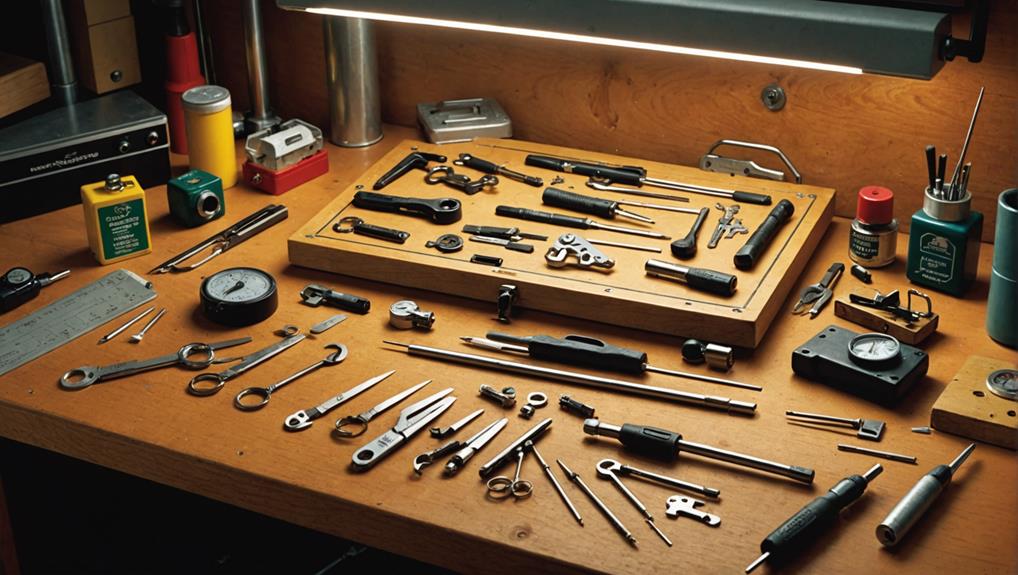
To successfully rekey your motorcycle or scooter locks, you'll need a few specific tools on hand. First, gather a rekeying kit that includes the appropriate pins, springs, and a key gauge. This kit will provide you with everything you need for scooter lock rekeying, including important tools for DIY projects.
Next, you'll want a set of precision screwdrivers to help you remove the lock cylinder easily. A pair of tweezers will also be handy for placing the tiny pins into the lock.
Additionally, consider using a flashlight to illuminate the internal components, making it easier to see what you're working with. A small bowl or container is useful for holding the pins and springs as you work, preventing them from rolling away.
Step-by-Step Rekeying Process
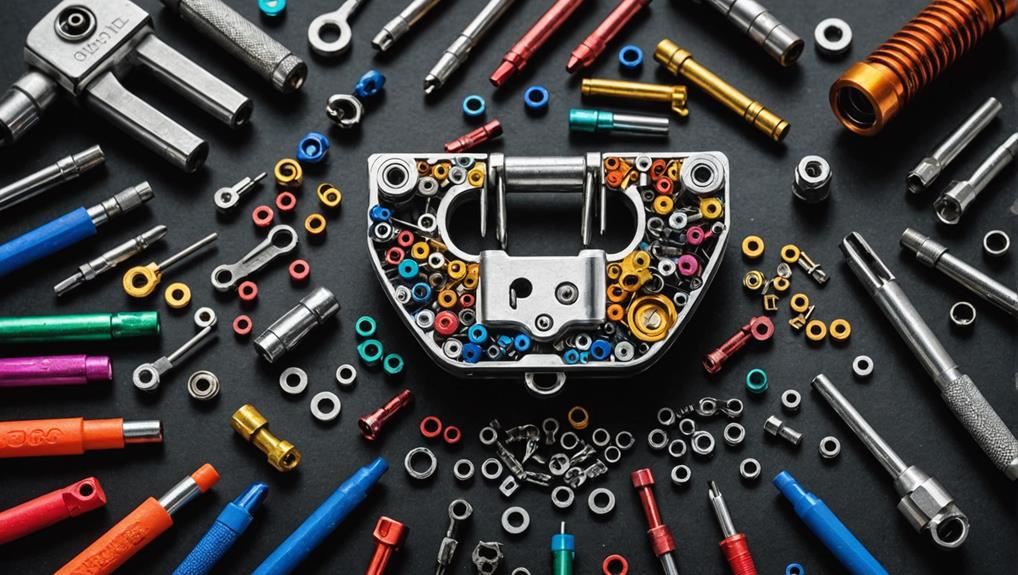
Successfully rekeying your motorcycle or scooter locks involves a straightforward process that can be tackled with patience and attention to detail.
Before you begin, it's vital to take into account both the cost and difficulty level associated with DIY lock rekeying.
Here's how to rekey bike locks in four easy steps:
- Disassemble the Lock: Carefully remove the lock from your bike. Use the appropriate tools to take it apart, keeping track of all the components.
- Remove the Old Pins: Once the lock is open, extract the old pins using a small tool. Make sure to note their sizes and arrangement to help with the new setup.
- Insert New Pins: Replace the old pins with new ones that match your new key. Confirm the pins are seated properly, as this is vital for the lock to function with the new key.
- Reassemble the Lock: Put the lock back together, confirming all components fit snugly. Test the new key multiple times to verify that everything operates smoothly.
Common Challenges Faced
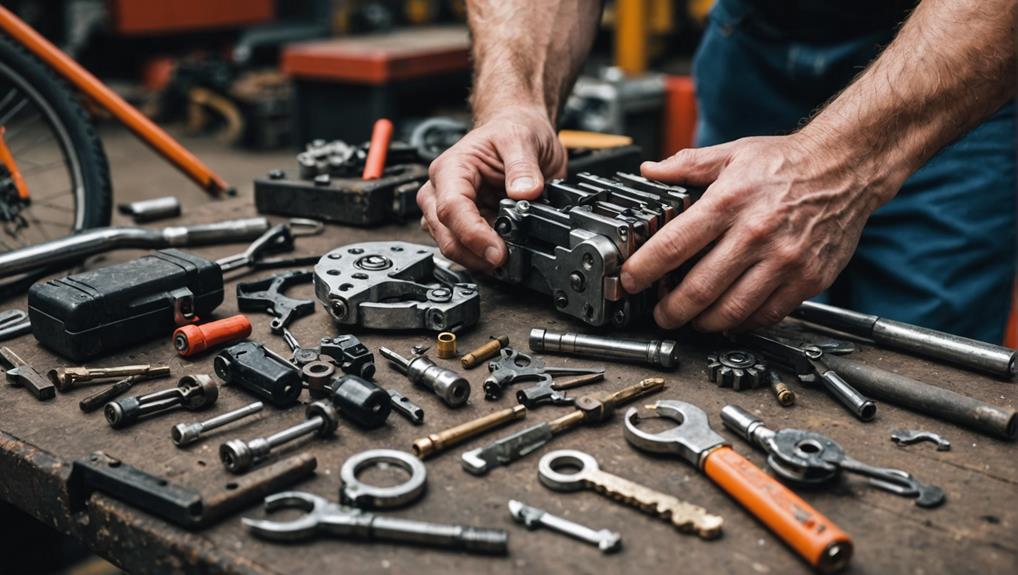
When tackling the rekeying process, you might encounter several common challenges that can complicate your efforts. One of the biggest hurdles is dealing with stubborn lock components. Sometimes, the pins or springs inside the lock may be jammed or corroded, making it tough to remove and replace them.
Re-keying locks requires patience and the right tools to navigate these issues effectively.
Another challenge you may face is ensuring you have the correct key blanks for your motorcycle or scooter. Using the wrong size or type can lead to frustration and wasted time. It's best to consult a professional if you're unsure.
You might also find that some locks are designed with complex mechanisms that aren't user-friendly. If you're not experienced, you could risk damaging the lock further. In cases like these, consider reaching out to specialized motorcycle locksmith services. They can efficiently handle these tricky situations, saving you time and ensuring your locks work smoothly post-rekeying.
Lastly, keeping track of all the small parts during rekeying can be a headache. Organization is key, so have a designated space for everything.
Maintenance Tips After Rekeying
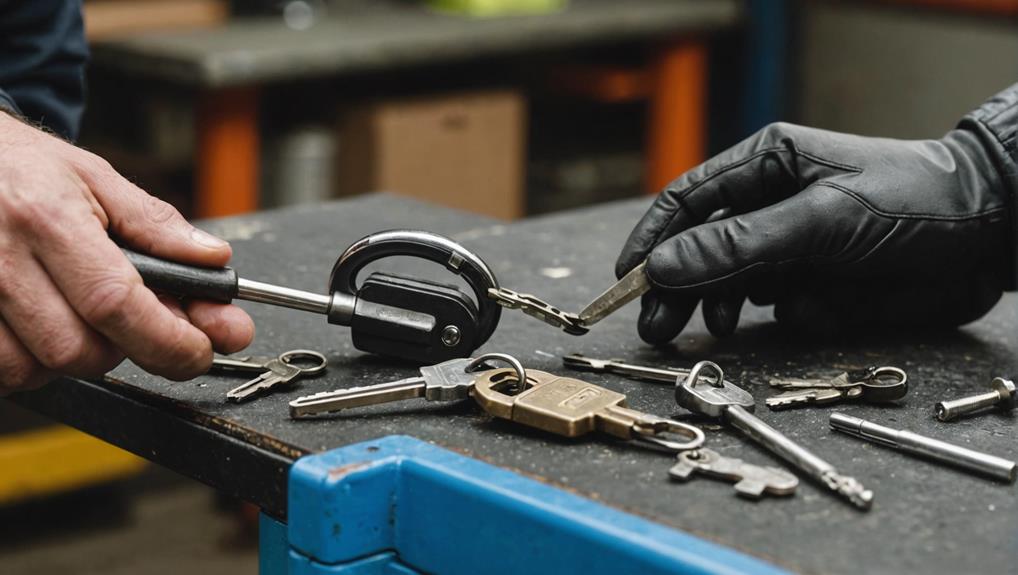
After rekeying your motorcycle or scooter locks, it's essential to implement a maintenance routine to guarantee their longevity and smooth operation.
Taking care of the locks not only secures your safety but also extends the life of your DIY motorcycle lock rekeying efforts. Regular upkeep can help you avoid common challenges encountered with locks, such as sticking or jamming, which can be addressed through step-by-step guidance.
Here are some simple tips to keep in mind:
- Regular Lubrication: Use a graphite-based lubricant to keep the lock mechanisms functioning smoothly. Avoid oil-based products as they can attract dirt.
- Clean the Locks: Periodically wipe down the lock cylinders and surrounding areas to remove dust and debris. This helps prevent jams.
- Inspect for Wear: Regularly check the locks for any signs of damage or wear. Addressing issues early can save you from bigger problems down the road.
- Test the Keys: Make sure to test your new keys regularly. If they begin to stick or don't turn smoothly, it might be time to re-evaluate your rekeying job.
Frequently Asked Questions
Can I Rekey Locks Myself Without Professional Help?
Yes, you can rekey locks yourself without professional help, but it requires some skill and the right tools.
You'll need a rekeying kit specific to your lock brand. Start by carefully following the instructions that come with the kit.
It might take some practice, so don't get discouraged if it doesn't work perfectly the first time.
Once you get the hang of it, you'll feel accomplished and empowered to tackle future lock issues.
How Much Does It Typically Cost to Rekey Motorcycle Locks?
When you think about rekeying motorcycle locks, picture a skilled locksmith crafting a new key from scratch, transforming your security.
Typically, rekeying costs you between $50 and $150, depending on the complexity of the locks and your location.
Although it may seem a bit pricey, investing in your safety and peace of mind is priceless.
Plus, you'll be serving your motorcycle's longevity, ensuring it stays secure for your adventures ahead.
Are All Motorcycle Locks Rekeyable?
Not all motorcycle locks are rekeyable. It really depends on the type and brand of your lock.
Some locks are designed with a specific key and can't be altered, while others allow for rekeying.
To find out if yours can be rekeyed, check the manufacturer's guidelines or consult a locksmith.
That way, you can guarantee your lock meets your security needs and keep your bike safe.
How Often Should I Consider Rekeying My Motorcycle Locks?
You should consider rekeying your motorcycle locks whenever you lose a key, buy a used bike, or suspect someone may have access to your keys.
It's also wise to rekey periodically, especially if you park in public places or share your motorcycle with others.
Staying proactive about your locks can enhance your security and give you peace of mind, ensuring only you and trusted individuals can access your ride.
What Are the Signs That I Need to Rekey My Locks?
You'll know it's time to rekey your locks if you've lost a key, moved to a new place, or notice any signs of wear.
If your key doesn't turn smoothly or you feel it's too easy to pick, that's a red flag.
Also, if you've shared your key with someone you can't trust, rekeying guarantees your security.
Staying proactive about your locks protects you and your belongings.
Conclusion
Rekeying your motorcycle or scooter locks is a smart, simple solution to securing your ride. By following the steps and tips outlined, you can confidently conquer the challenges that come your way. Remember, regular maintenance guarantees long-lasting locks and peace of mind. With a little patience and practice, you'll protect your prized possession and ride freely without worry. So, embrace the ease of rekeying, and keep your wheels safe and sound on the open road!

